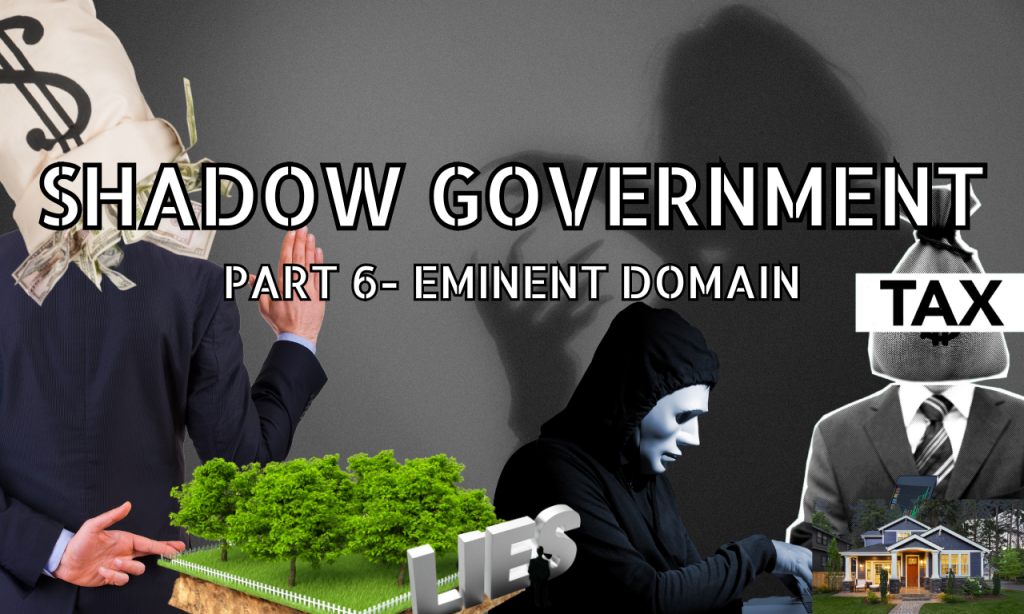BY: Veronica Harper
For those of you old enough to remember the Flower Patch saga in 1993, you will remember the battle between the owners of the flower shop verses Salt Lake City Redevelopment Agency (RDA) and one of Utah’s most prominent businessmen, Earl Holding. The (RDA) and Holding wanted the land located at 502 S State Street for the Grand America Hotel & Resorts. Holding was very influential and used his status to convince the RDA to declare the area surrounding the Flower Patch blighted.
The issue between the Flower Patch and the RDA was one of eminent domain. The city declared it a blighted area and thus able to take the land using eminent domain. Property or land that has been declared blighted declines in value and developers can pick the land up for pennies on the dollar.
The owners of the flower shop fought back on constitutional grounds and won. The Flower Patch was a symbol of hope for the small business owner who battled a behemoth and won. The developers had to build the hotel behind the shop. The owners of the flower shop spent over $350,000 fighting in court instead of remodeling the building. However, in December 2013, with little fanfare, the property was sold to Grand America Hotel & Resorts. They finished out their lease and in March of 2014 the shop closed its doors for good. A parking lot took the place of a symbol of hope for the small business owner. It was foreshadowing of things to come.
SOURCE: Flower Patch Controversy
But what does this have to do with special districts? Plenty. Over the course of many years, the Utah Legislature has been slowly modifying statute in regard to eminent domain. In 2023 alone there was over 270 query results when I typed it into the search bar. In my previous articles, I explained that land developers could buy land and create their own special district, which makes them a quasi-government entity. They can also create public infrastructure districts within the special district. The bills favoring the special districts allow for eminent domain.
I stressed this in my previous articles. There is a transfer of power taking place from the people, whose rights are guaranteed under the constitution, to the state/land developers. In my previous article I said we have these documents as a written statement about our natural born rights. They are in place to support those rights and operate under a free government by holding our elected officials accountable. Our rights have incrementally been taken from us. The reason? We do not know them and if we do, the majority fail to engage with our elected officials. Knowing your rights but choosing to do nothing is a waste of your talent and ability to affect change. You know the saying when the cat’s away the mice will play. I personally would change that to rats instead of mice, but I digress. We must stay vigilant and hold our elected officials accountable. The transfer of power away from the people is done with each passing bill that gives power to anyone other than We The People. Land developers are appointed and yet they can wield power over us via bonds, essentially taxing us without being held accountable. They reap the benefits while the taxpayer is burdened repaying the debt. The developer has little to no risk.
In the last several years there have been a number of bills introduced, some of which have passed, that deal with eminent domain.
2019 | 2020 | 2021 | 2022 | 2023 |
HB401 | HB133 | HB28 PASS | HB85 | HB196 |
HB198 PASS | HB83S1 PASS | HB304 | HB257 PASS | |
HB261 | HB317 | HB357 PASS | HB26 PASS | |
SB205 PASS | HB449 | SB212 PASS | ||
SB65 PASS | HB150 PASS | |||
SB71 | SB76 PASS | |||
HB26 PASS | ||||
What is interesting about the bills passed during this last legislative session is the fact that some seemingly don’t have anything to do with eminent domain. For example, HB26 is the License Plate Amendments bill. Why would a bill that deals with license plates need to have this in the bill?
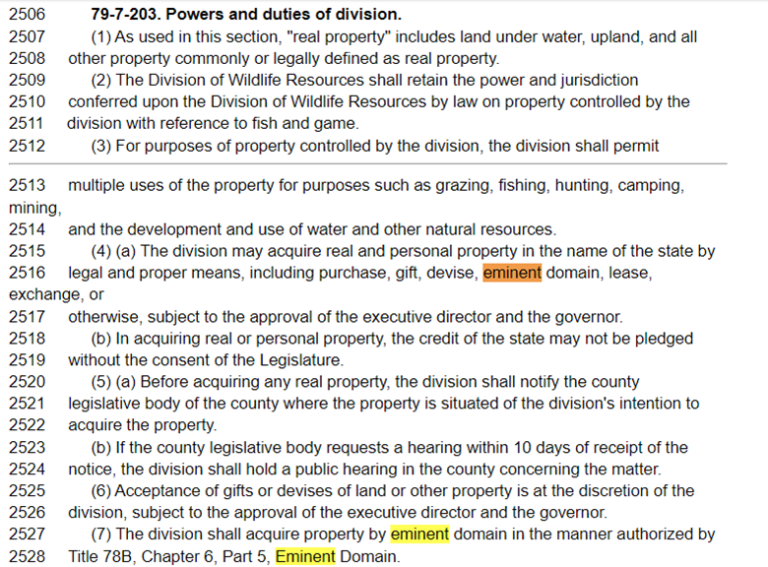
This is the part of the code that was removed.

HB26 also created this under section 41-1a-122;
500 Section 5. Section 41-1a-122 is enacted to read:
501 41-1a-122. License Plate Restricted Account.
502 (1) As used in this section, “account” means the License Plate Restricted Account
503 created by this section.
504 (2) There is created within the General Fund a restricted account known as the License
505 Plate Restricted Account.
506 (3) (a) The account shall be funded from the fees described in Subsection
507 41-1a-1201(3).
508 (b) The fees described in Subsection (3)(a) shall be paid to the division, which shall
509 deposit them in the account.
510 (4) The Legislature shall appropriate the funds in the account to the commission to
511 cover the costs of issuing license plates and decals.
512 (5) In accordance with Section 63J-1-602.1, appropriations made to the division from
513 the account are nonlapsing.
Why are they creating a restricted account? This means that our state auditor cannot see what is going into or out of this or any restricted account. And why would HB26 include a section regarding eminent domain? This bill is filled with plenty of things that fall outside the scope of license plates. Is this what people mean when they say bills are full of pork barrel spending? It is a question worth asking.
Now compare this to SB92. This bill does not have those portions of the code above that HB26 has. Why is that? In fact, SB92 does not have a lot of what HB26 has and yet it deals with license plates as well. Interesting.
Then there is SB212, the Utah Communications Authority Amendments. The highlights of this bill
12 ▸ defines terms; requires the Retirement and Independent Entities Committee to provide
14 recommendations regarding the Utah Communications Authority to the Legislative
15 Management Committee;
16 ▸ increases the amount of funds that can be distributed to a qualifying public safety
17 answering point (“PSAP”);
18 ▸ requires a PSAP to be designated as an emergency medical service dispatch center
19 to receive certain funds;
20 ▸ clarifies how long funds will not be distributed to a non-qualifying PSAP;
21 ▸ allows a public agency to create a PSAP to provide 911 service to non-contiguous
22 areas in certain situations; and
23 ▸ makes technical and conforming changes.
What is NOT mentioned in the highlighted portion is the Utah Communications Authority has the power to
116 (g) acquire, by gift, grant, purchase, or by exercise of eminent domain, any real, any real
117 property or personal property in connection with the acquisition and construction of a public
118 safety communications network and all related facilities and rights-of-way that the authority
119 owns, operates, and maintains;
I used the above examples to show you how important it is to read bills. Things are added into or taken out that could have serious consequences for the public. In the case of special districts, there is plenty of concern.
Trying to unravel this mess can get frustrating because there are so many things that have to be tied together. The question remains, are special districts really given authority to invoke eminent domain? Let’s take a look shall we.
On page 3 of Title 17D. Limited Purpose Local Government Entities – Other Entities , it clearly states what a special district is and what it can do;
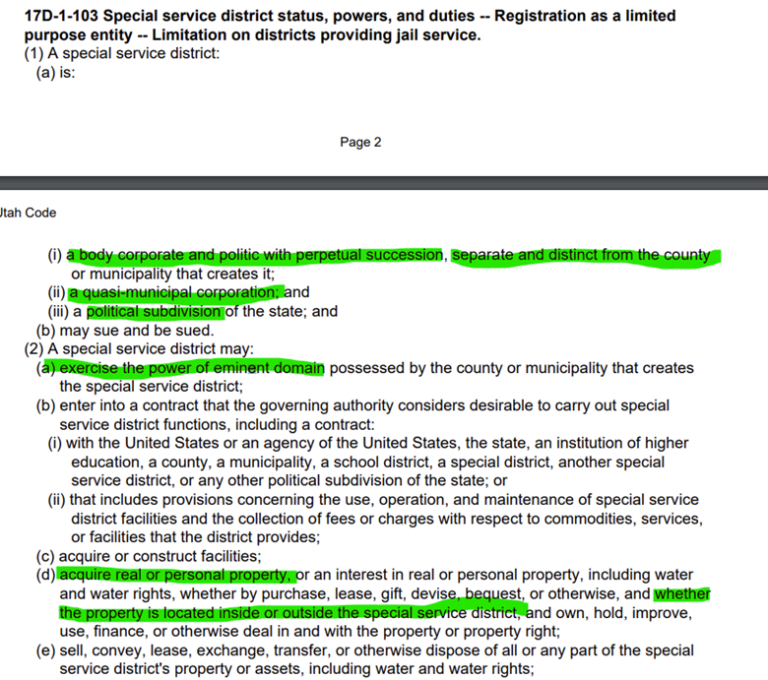
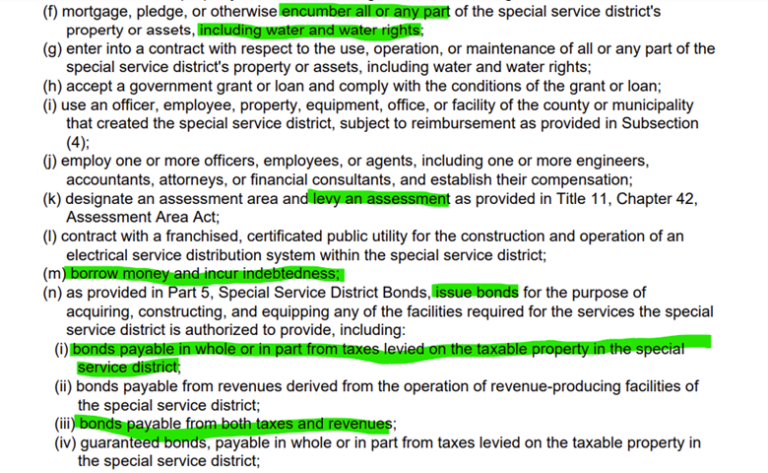
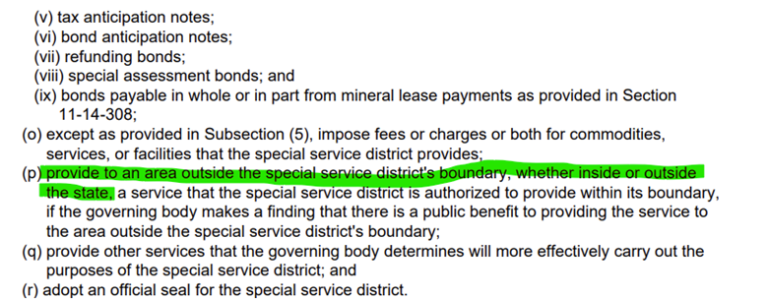
As you can see, there is quite a number of things the special district can do apart from exercising eminent domain. It is written in the code that they may exercise the power of eminent domain, levy assessments, incur debt, issue bonds, levy taxes within the special district, etc. Why would our legislature give so much power to land developers? It does not say how these special districts are held accountable and to whom. That should concern everyone no matter what political affiliation you ascribe to.
As an example, look at an article by KSL and a subsequent letter from Mayor Erin Mendenhall regarding the creation of a Public Infrastructure District (PID). Please note, things have changed within the contract as a result of public outcry but what hasn’t changed is the fact that the Utah Inland Port Authority MUST use that PID and the $150,000,000 worth of bonds. Below are snapshots from both the article and the letter.
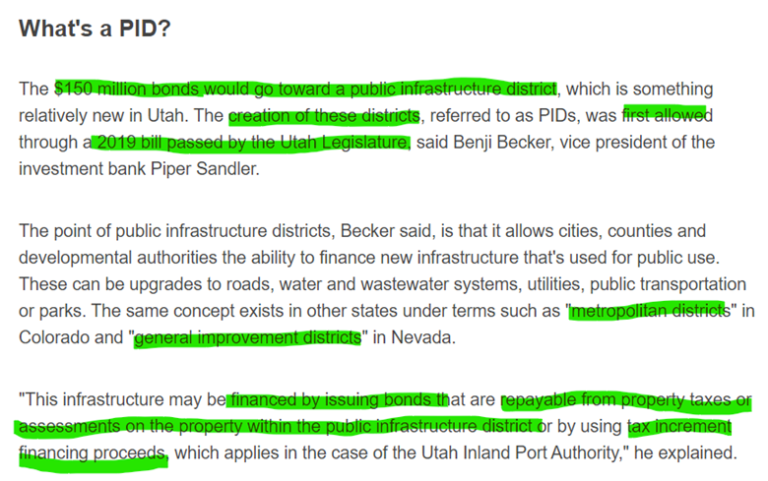
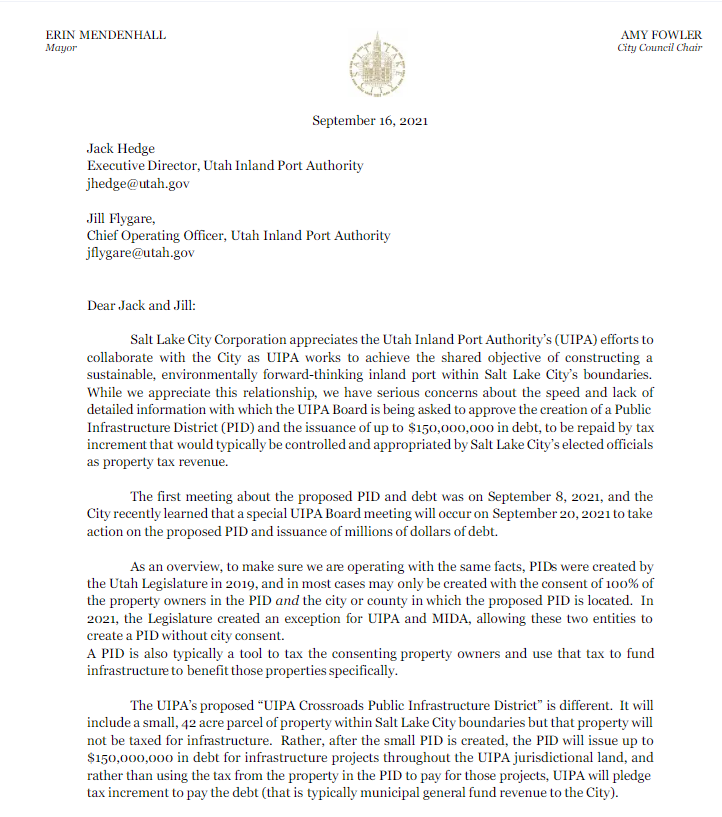
The entire letter can be read by clicking on the link above. This is page one of the letter and as you can see, there are some concerns with the creation of the PID. As I stated earlier, it should not matter what political affiliation you claim, this affects everyone.
In a presentation prepared by Gilmore Bell, a law firm in Salt Lake City, they explain what PID’s can do. For example, their creation and powers are highlighted.
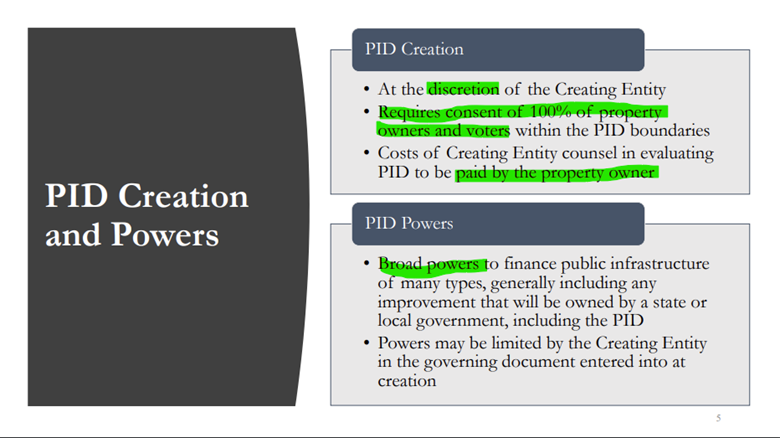
Have 100% of property owners and voters given consent for the creation of the PIDs in our state? If not, how could their creation continue? It states in their own presentation that 100% of property owners and voters in the PID (district) must give their consent.
Well, in this video by John Oliver around 9 minutes in he tells you how they can do this with a loophole.
It also states in Title 17D. Limited Purpose Local Government Entities – Other Entities regarding 100% of property owners and voters must sign.
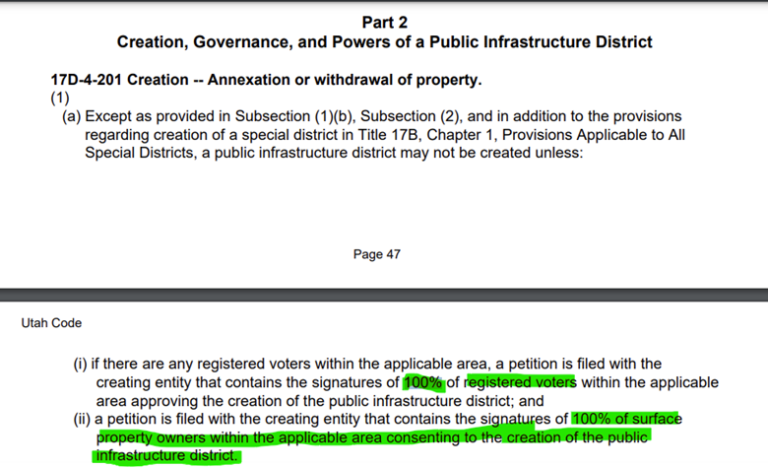
As stated previously, not every special district is bad. However, with the way the laws have been passed in relation to and creation of special districts and or government entities such as, Utah Inland Port Authority, Utah Lake Authority, Military Installation Development Authority, Point of the Mountain State Land Authority, there is a power shift in favor of the quasi-government special district. There is no accountability to the people, their taxing authority has the potential to tax us out of our homes, and they are creating projects that generate millions of dollars of profit despite the many voices of opposition.
In this never-ending tug of war, the people of Utah must find a way to come together on this topic and work to stop this shift in power. If we do not, we will lose our freedoms and possibly our very own property.
An epic land battle ends with a landscaped surface parking lot – Building Salt Lake
Justices’ ruling favors cities in use of eminent domain – Deseret News

